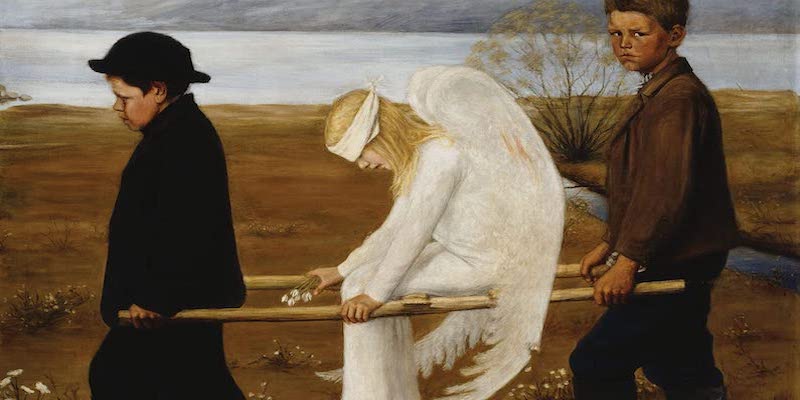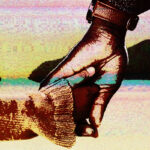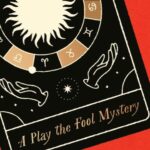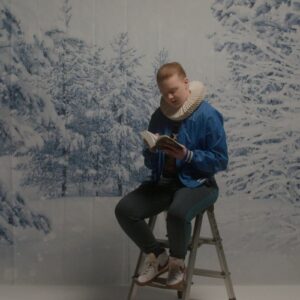Ghosts, Specters, and Hauntings: 7 New Poetry Books to Read in November
David Woo Recommends an Ancient Chinese Poet, a Nobel Prize Laureate, and More
“I was surrounded by ghosts,” wrote Tomas Tranströmer. “And I myself was a ghost.”
Many kinds of ghost haunt these autumn releases. The specter of a wayward brother inhabits Kelly Rowe’s new book, and a paralyzed Russian gymnast and a ghoulishly affable American politician possess Timmy Straw’s. If the spirits of Geoffrey Hill, Derek Walcott, and David Jones murmur in Ishion Hutchinson’s new book, the result sounds less like naked influence than joyous assimilation at the behest of a poem’s inner cadence. Hutchinson, whose last collection won the National Book Critics Circle Award for poetry, has created a work that is both audaciously original and splendidly ensconced in a lineage of Caribbean and British poets.
Two of the books are by deceased writers: Tao Yuanming, one of the greatest of ancient Chinese poets; and Tranströmer, the Swedish, Nobel Prize laureate, whose work spanned more than a half century from the 1950s to the 2000s. Because the ghosts of literary tradition assume the condition of all the dead (“spared from swallowing the morality of power,” as Tranströmer put it), they offer escape from the parochial concerns of the present day, haunting us with the strangeness and familiarity of their 仁 (ren) or “human-heartedness.”

Jen Campbell, Please Do Not Touch This Exhibit
(Bloodaxe Books)
“Nine months later, I am clawed / from the sea. // A river child. // A lobster baby.” Campbell, an English poet, was born with a dysplasia syndrome of the fingers nine months after the Chernobyl disaster rained radioactive isotopes across Europe. The poems in this poignant collection approach the effects of the syndrome with frankness, irony, anger, and good humor, showing an equable alertness to the metaphorical bounty in her experience: “Now my hands are birds / elephants / rock salt / constellations / anemone.”
Interspersed with medical notes from the sometimes dreadful doctors who performed surgeries on her as a child (“Jennifer…is very active and eager to please—a fascinating specimen”), the book becomes a wrenching vision of the body as domain and shelter—houses, empty eggs in a nest, even the carnival freak shows of the past—which she valiantly constructs as trauma and otherness threaten to unhouse her from her own body: “The house flickers / into focus, // jellyfish, then /gone again.”

Nick Flynn, Low
(Graywolf Press)
Divided into “sides” like some strangely linear, multi-album LP, Flynn’s collection describes a past that persists in the memory but is mostly as archaic as vinyl records: youthful addiction and self-destruction, peasant ancestors named “Flynn” (from the Irish flann, ruddy, red-faced), an exigent father who is now merely the ashes a son keeps. If the poet’s attitude toward life remains disabused, “a black crystal / spiderweb draping each word,” these beautifully spare, unsparing poems find a way past further self-destruction through his love for a witty, inquisitive daughter and the search for a meaningful place to return to: “the past was a horse crossing a desert / a body draped over it // this is how we get the beloved home.”

Ishion Hutchinson, School of Instructions
(Farrar, Straus and Giroux)
One of our best poets, Hutchinson renovates the high styles of British modernism and Caribbean postwar lyric poetry by juxtaposing the little-commemorated lives of Black, West Indian soldiers fighting for Britain in the Middle East during World War I with the more recent education of the poet’s alter ego, a Jamaican schoolboy ironically named Godspeed. Reverberating hauntingly like an overheard litany, in a language of demotic lyricism (“his jam jar of blinky blink fireflies”) and sonorous, Miltonian grandeur (“They resurrected new counterkingdoms / by the arbitrament of the sword mud”), this book-length poem wields the teeming arc of history as a single, double-faced implement to trace the multigenerational wound of colonialism, racism, and war.

Kelly Rowe, Rise above the River
(Able Muse Press)
“You left home,” Rowe writes of her brother, “the other one came back.” The subject of this focused collection is the mystery of the late brother’s otherness, how the lovely boy with an angelic voice (“the pure high notes / of the strange music the planets wrote / only for him”) became the wayward adult soul (“that stump filled with nails”) who crashes cars, steals their dying mother’s morphine, and bequeaths his last valuable, a gold watch, to the murderer who is his cellmate in prison.
Rowe’s search for answers enacts in poetic form the fractious delicacy and helpless distancing of sibling love. Even if the speaker is not Antigone, the sister who would die for her brother, but “a minor character…attached / but invisible,” a sister’s devotion glows in the persistent equanimity with which she captures the enigma of his estrangement, like the “little feral cat” near the start of the book, who sits by her brother “all its lives intact,” and the cat she sees at the end, its shape forming in his ashes as they sink into the Mississippi.
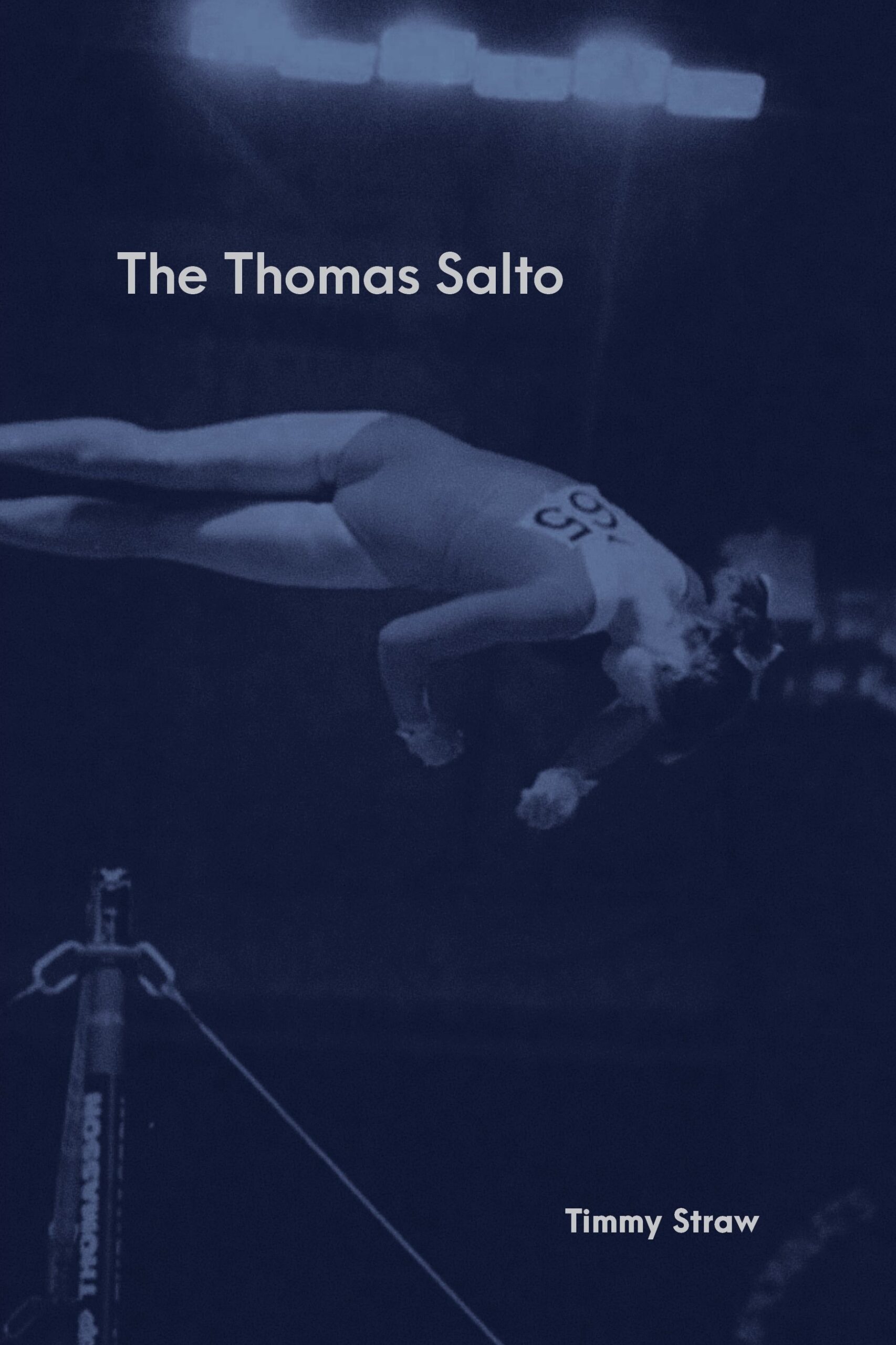
Timmy Straw, The Thomas Salto
(Fonograf Editions)
In this poised and philosophically astute debut, Straw assembles the constituent parts of a self—the “things we learned but did not know and / could / not say”—and aspires to a poetry that “grows outward to all edges like a self.” Impressions of Cold War history from the speaker’s early childhood, especially a B-list celebrity president and a Soviet athlete made quadriplegic from the gymnastics move of the title, form an “incipience” that unfolds into an understanding of personal, cultural, and political history.
If the book is interspersed with a few modish, erasure-adjacent samplings (Reagan’s speeches ironized by his unironic jingoism), its strength resides in moments of epigrammatic grace and metaphorical fluency. “It is the task of a life,” Straw writes, “to keep the mind / moving in measure / with its shadow, / to outpace the acts / the mind in shadow makes.” With a paradoxical beauty, the book’s aesthetic modesty—“spare, spare, my trinket soul”—finds ways to expand into the ontological: “The wave that will take us is very small / is hiding in the word itself.”

Tao Yuanming, Choosing to Be Simple: Collected Poems of Tao Yuanming (trans. Red Pine)
(Copper Canyon Press)
Reading a great ancient poet, like the reclusive Tao Yuanming (365-427), is one of the most congenial ways to assess what feels timeless amidst the tumult of our own times: here, the desire for a meaningful life, the disappointment of worldly ambition, the joy of solitude and friendship, even the struggle to overcome addiction, as in the stunningly modern “Stopping Drinking” (literally “Stop Wine”), which repeats the word “stop” (止) in each line.
Tao’s impeccable translator Red Pine follows the traditional Chinese practice of offering scholarly commentary for each poem, but what persists in the transmutation to present-day English is less the discord of bygone dynasties than the poet’s quest for spiritual harmony, as in the longed-for utopia of “Peach Blossom Spring”: “I’ll go there as soon as the weather is warmer / hopefully with someone who knows me.”

Tomas Tranströmer, The Blue House: Collected Works of Tomas Tranströmer (trans. Patty Crane)
(Copper Canyon Press)
“And now it’s happening,” Tomas Tranströmer wrote, “the fragments are flying together, the mosaic appears.” Across the fourteen volumes translated here, Tranströmer (1931-2015) assembled a poetic mosaic as various as a well-contemplated life could be and “at just the right distance / from reality.” Known for compressed perceptions that capture numinous mysteries within the ranges of ordinary life (“The divine brushes up against a person and lights a flame / but then draws back. / Why?”), he found deceptively simple but brilliant ways to suggest the intersection of a grand natural order with the mundanely human, as when a walk in the “colorblind dark” conjures what the present feels like to a middle-aged person: “A time span / several minutes long /fifty-eight years wide.”
While some of his most beautiful poems explicate sad themes like the isolation of an ailing child (“After a Seizure”) and the bleak advent of a Swedish winter (“Winter’s Glance”), Tranströmer dismantled any Scandinavian stereotype of lugubrious alienation, finding the countervailing value within the despair (“You drank the darkness / and became visible”) or celebrating ordinary pleasures like espresso: “the black droplets of deep insight / sometimes intercepted by the soul.” Patty Crane’s beautifully judged translation fulfills the need for a version of Tranströmer in a current, American idiom. A must for the poetry lover’s library.

